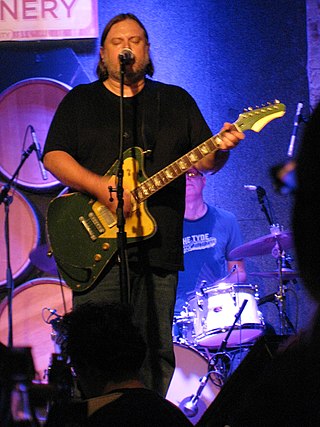
Sidney Matthew Sweet is an American alternative rock/power pop singer-songwriter and musician who was part of the burgeoning music scene in Athens, Georgia, during the 1980s before gaining commercial success in the 1990s as a solo artist. His companion albums, Tomorrow Forever and Tomorrow's Daughter, were followed by 2018's Wicked System of Things and 2021's Catspaw, his 15th studio effort.
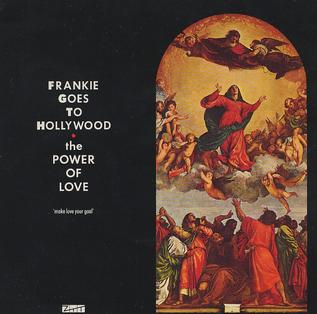
"The Power of Love" is a song originally recorded and released by British band Frankie Goes to Hollywood. It was written by Holly Johnson, Peter Gill, Mark O'Toole and Brian Nash, four of the five members of the band. It was released by the group as their third single.

Fairytale is the second album from Scottish singer-songwriter Donovan. It was first released in the UK on 22 October 1965 through Pye Records. The US version of Fairytale was released by Hickory Records in November 1965 with a slightly different set of songs. Peter Eden, Geoff Stephens and Terry Kennedy produced the original album.
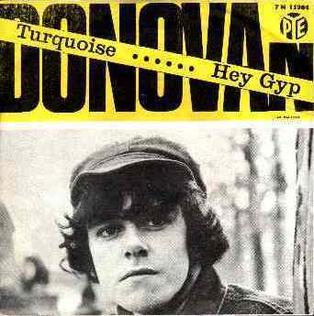
"Turquoise" is a song written and recorded by British singer-songwriter Donovan. The "Turquoise" single was released in the United Kingdom on 30 October 1965 through Pye Records and charted, peaking at No.30. The "Turquoise" single was backed with "Hey Gyp " and only released in the United Kingdom. "Turquoise" was released as the b-side on "To Try for the Sun" in the United States.

Blue Wild Angel: Live at the Isle of Wight is a posthumous live album by Jimi Hendrix released on November 12, 2002. The album documents Hendrix's last U.K. live performance at the Isle of Wight Festival on August 31, 1970, three weeks before his death. The set list for the concert contained songs from the original Experience albums, as well as new songs. Some were previously available on Isle of Wight (1971) and Live Isle of Wight '70 (1991). "Power to Love ", "Midnight Lightning", and "Foxy Lady" released in the US on the three record set The First Great Rock Festivals of the 70s: Isle of Wight/Atlanta Pop Festival" released on Columbia Records in 1971.

"Thursday's Child" is a song recorded by David Bowie for his twenty-second studio album Hours (1999). Written by Bowie and Reeves Gabrels, the song was released as the album's lead single on 20 September 1999, by Virgin Records.

Black Antlers is a studio album by the experimental band Coil. It was originally released in CD-R format in 2004 in a limited edition and was sold during their Even an Evil Fatigue mini-tour. The album was later re-edited by Peter Christopherson and expanded to include a second CD of two new tracks, as well as a new track on the first disc. The second edition was released in August 2006 on the same day as the expanded version of The Remote Viewer. Both reissues were mastered by Mark Godwin, printed in Thailand and feature high quality images and packaging. Although the original edition did not include a catalogue number, the reissue was given a catalogue number of THBKK2.

"Bring the Noise" is a song by the American hip hop group Public Enemy. It was included on the soundtrack of the 1987 film Less than Zero; the song was also released as a single that year. It later became the first song on the group's 1988 album, It Takes a Nation of Millions to Hold Us Back. The single reached No. 56 on the Billboard Hot R&B/Hip-Hop Songs chart.

"Freedom" is a rock song by Jimi Hendrix that is often regarded as one of the most fully realized pieces he wrote and recorded in the months before his death. It incorporates several musical styles and the lyrics reflect various situations facing Hendrix at the time.

Rainbow Bridge is a compilation album by American rock musician Jimi Hendrix. It was the second posthumous album release by his official record company and is mostly composed of recordings Hendrix made in 1969 and 1970 after the breakup of the Jimi Hendrix Experience. Despite the cover photo and subtitle Original Motion Picture Sound Track, it does not contain any songs recorded during his concert appearance for the 1971 film Rainbow Bridge.
"Stepping Stone" is a song by American musician Jimi Hendrix. Written and produced by Hendrix, he recorded it early in 1970 with the short-lived Band of Gypsys lineup of Hendrix, Billy Cox and Buddy Miles. The song, with "Izabella", was released as a single by Reprise Records on April 8, 1970. It was the last single released by Hendrix before his death. Other versions are included on posthumous albums.

Eric Burdon was a lead vocalist with The Animals, War, and other bands.
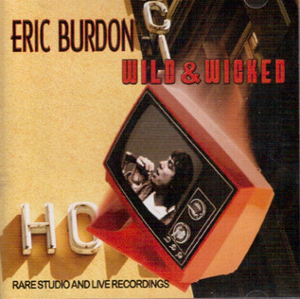
Wild & Wicked is a 2006 compilation album by Eric Burdon.
"The House of the Rising Sun" is a traditional folk song, sometimes called "Rising Sun Blues". It tells of a person's life gone wrong in the city of New Orleans. Many versions also urge a sibling or parents and children to avoid the same fate. The most successful commercial version, recorded in 1964 by the British rock band the Animals, was a number one hit on the UK Singles Chart and in the US and Canada. As a traditional folk song recorded by an electric rock band, it has been described as the "first folk rock hit".

Live at the Roxy is an album by Eric Burdon recorded in May 1975. It features songs from the "Mirage project". It was released in 1998.
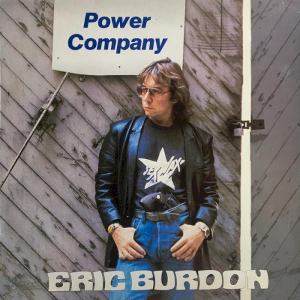
Power Company is an album by the Eric Burdon Band, released in 1983. It features recordings from the Comeback project. It also features live recordings.

Wicked Man is a compilation album by Eric Burdon, released in 1988.
Footwork, also called juke, footwork/juke or Chicago juke, is a genre of electronic dance music derived from ghetto house with elements of hip hop, first appearing in Chicago in the late 1990s. The music style evolved from the earlier, rapid rhythms of ghetto house, a change pioneered by RP Boo. It may draw from the rapid rhythms and sub-bass frequencies of drum & bass. Tracks also frequently feature heavily syncopated samples from rap, pop and other sources, and are often around 160 bpm.
American guitarist Jimi Hendrix intended to release his fourth studio album as a double or triple LP before Christmas 1970. From June to August 1970, he made good progress on the realization of the planned album in his new Electric Lady Studios. Many songs were mixed on 20, 22 and 24 August. Four of these mixes were regarded as definitive versions and were presented at the opening party of Electric Lady on 26 August. Hendrix died on 18 September that year, leaving behind an enormous number of unreleased recordings in various stages of completion. It is impossible to know what Hendrix would have changed and what he actually would have released, but there is some documentation of the album configurations he had in mind. While a good amount of the designated tracks only needed some finishing touches, others only existed as rough recordings, and for some titles no recordings are known to exist. The Cry of Love (1971), Voodoo Soup (1995) and First Rays of the New Rising Sun (1997) are officially released attempts to reconstruct the planned album. First Rays of the New Rising Sun is usually regarded as closest to Hendrix's vision, but features a track that was probably never part of Hendrix's plans and omits some tracks that were definitely considered. All but one of the tracks that are known to have been recorded for the album have eventually been released in some form on official albums.
"Hey Baby (New Rising Sun)" or simply "Hey Baby" is a song written and recorded by American musician Jimi Hendrix, from his second posthumous album Rainbow Bridge (1971). The song is a slower and more melodic piece, which features the prominent use of chorus- and tremolo-effects on guitar. Hendrix uses an idealized feminine figure that recurs in several of his lyrics. Commentators have seen the song as representative of his post-Band of Gypsys musical direction.















